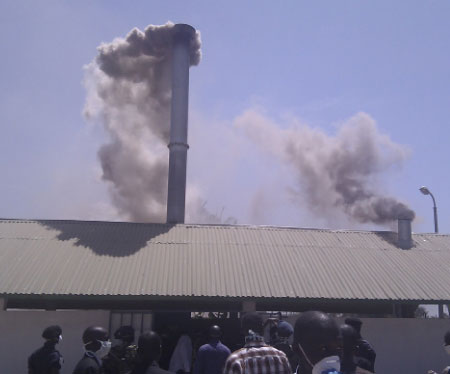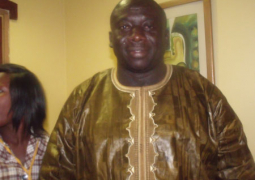
Barely two years and a half after The Gambia was top of the international news headlines for seizing a record more than two tonnes of cocaine worth about one billion dollars, the country yesterday witnessed a public destruction of the seized cocaine.
Witnessed by cabinet ministers led by Secretary General and Minister for Presidential Affairs, Dr Njogu Bah, the British and American ambassadors among others, the destruction saw the burning of two tonnes, 190kg, 500 grams of cocaine with an incinerator donated by the British High Commission in Banjul at the National Medical Laboratory in Kotu.
In June 2010, Gambian anti-narcotics agents in a joint operation with the UK Serious Organised Crime Agency (SOCA) discovered the cocaine hidden in a bunker in Bonto village in an operation, which officials said, highlighted the growing popularity of West Africa for South American drug cartels.
This discovery led to the arrest, prosecution and jailing of a total of eight foreign nationals, including Venezuelan and Dutch nationals to 50 years in jail and fines of D50 million by the Banjul Magistrates Court presided over by Magistrate Sheriff Tabally, in October 2011.
In a statement read on his behalf by the Secretary General and Head of the Civil Service, Dr Njogu Bah, who is also the Minister for Presidential Affairs and Information and Communication Infrastructure, President Yahya Jammeh said the first significant implication of this drugs destruction exercise confirms that, ever since the advent of his government in 1994, he had consistently made it clear that his government would never be a party to any kind of social ill that has the potential of wrecking the future of the citizens of this country, especially the youth.
“The second significant ramification of this destruction exercise is that, for once and for posterity, we are able to show the whole world that The Gambia’s stance on drugs and corruption is clear; as we are translating our slogan: ‘No to Drugs and Corruption’ into concrete action,” he stated.
President Jammeh again emphasized his government’s position that while the sub-region has been targeted as a conduit for hard drugs destined for the West, The Gambia will never be part of such a hub.
“We are more determined than ever before to ascertain that the Gambian people do not allow their borders and resources to be used either for internal drug trade or for the notorious transit of any illicit substances to other countries,” he added.
While commending the men and women of the National Drug Enforcement Agency, NDEA, the Gambian leader also lauded the British High Commission in The Gambia for their support, especially with the provision of an incinerator for the agency.
Samba Gajaga, Director General of the NDEA, said combating drugs is one of the hardest jobs one can embark upon in modern times.
“The public destruction of drugs is not only meant to allay public fears that the drugs seized by the agency may be re-circulated, but also to show to the whole world that The Gambia, as small as we may be, we are capable of countering the greatest threats associated with drug trafficking, organized crime and other related vices in our society,” Gajaga stated.
According to him, drug abuse and drug trafficking are problematic issues in the sub-region, and the West African region has recently been a target for the transit of hard drugs meant for Western Europe.
He assured all that the NDEA with the help of other sister security outfits and the Gambian population is doing everything possible to curb the drug menace through active collaboration, mass sensitization, education and enforcement of the drug control Act 2003 and its subsequent amendments.
Dr. Abubacarr Senghore, chairman of the NDEA Board, described the day as historic, especially coming at a time in the history of law enforcement in West Africa or the sub-region that such a quantity of large or hard drugs is being destroyed in a single destruction exercise.
Meanwhile, after the destruction exercise, certificates of appreciation were awarded to individuals and other institutions such as GAF, GPF, NIA, GRA, as well as the British High Commission, the French Narcotics Agency, the UK Serious Organization Crime Agency (SOCA) and BEA in USA.



